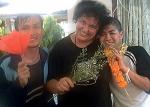Catholics In Vietnam
Catholics have never had an easy time of it in Vietnam beginning with the Confucian elite who opposed the intrusions of missionaries among whom was Alexandre de Rhodes who devised the system of romanisation of the Vietnamese language. Catholics refused to join in or pay for important village festivals; instead they often set up their own villages-a process that heightened disputes over land and water. The religion, seen by a majority of Vietnamese as an uncivilised intoxicant that sucked people in and broke their familial and social ties, often cut off converts from their families. It must have seemed as alien and dangerous as some of the stranger cults do today. The role of Catholics, many of whom acted as spies and guides for French expeditionary forces whom they believed would protect them from the anti-Catholic pogroms, rankles with some Vietnamese even today.
As defeat of the French became inevitable, thousands fled to the south. They knew a powerful and atheist Vietnamese state would not be friendly to Catholicism. To make matter worse South Vietnamese President Ngo Dinh Diem gave the refugees special attention and often let them settle on some of the most fertile land, a source of resentment among the majority of the population. Diem came from a deeply Catholic family; one of his brothers was Archbishop of Hue and a nephew would become Bishop of Nha Trang. His brutal suppression of peaceful demonstrations by Buddhist monks, some of whom burnt themselves alive in protest against Diem’s policies, and his corruption gave the Communists fuel for their fire and were among the factors that led to his overthrow and assassination, with US complicity, in 1963. In 1975 the seminaries in the South were emptied and many of the men were sent to re-education camps. The Church still arouses an intense suspicion in the Communist Party and the Vatican and Vietnam are something of a match for each other diplomatically, according to Templer.
Tags: Reading, Viet Nam

